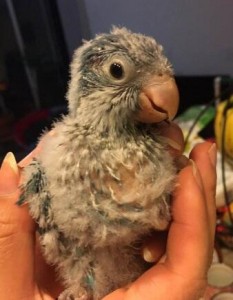A crop (croup/craw/ingluvies) is a thin-walled expanded portion of the alimentary tract used for the storage of food prior to digestion. Due to some reasons, the food stop inside the corp and accumuate to make the crop become big and hard, then we call it “hard crop” which often happens on parrots. Hard crop is often seen on a baby bird. Once you find your baby bird’s crop getting hard and such a symptom last to the next day, your bird may be very possible to get a “hard crop”. If it’s not treated immediately, the bird will die soon (in 3-7 days).

Treatments for “hard crop” of a baby parrot
- Stop feeding food to the bird immediately, but to feed with electrolytes and/or glucose water to supplement energy and regulate body fluid balance,better to add with some probiotics.
- Massage the crop gently after feeding with electrolytes and/or glucose water to soften the accumulated food and make it go down into digestive tract or just vomit it out.
- Mild symptom of crop infection does not need to be treated with medicine (probiotics and electrolytes are not medicine).
- When the symptoms are obvious (the crop is big and hard), you can consider giving a very small amount of antibiotics (If you are not sure about the dosage of antibiotics, or you worried about the harm of antibiotics, you can attempt to use garlic water instead.).
Why “hard crop” happens
- The baby bird constantly asks for food, and bird owner overfeeds, resulting in a indigestion problem and accumulation of food reidues in crop. Normally, it is not easy to suffer from indigestion when being fed by the parent birds who digests food firstly, but the artificial feeding is not the same thing!
- In the cold season, when the temperature is not well controlled, especially in the evening when the temperature drops down quickly. The bird owner feeds the bird in late night, due to the continuous decrease of temperature, the digestion activity is weakened, the before food is not digested completely, and the new food covers over, bacteria are produced by fermentation, thus the accumulated food becomes hard and blocks the digestive tract.
- Factor of feeding temperature. The crop and esophageal wall have mucous membrane which is very delicate. Hot or cold food will damage the mucous membrane which will be infected. And then the secretion of digestive fluid is insufficient to cause food accumulation due to poor digestion.
Prevention of “hard crop”
- Do not overfeed.
- Keep warm both for food and baby bird.
